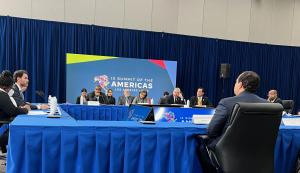Strategic Dialogue with Prime Minister Henry, Minister Ebrard, Mayor Garcetti, Partnership CEO Jonathan Fantini-Porter
Partnership for Central America joins strategic dialogue with Haitian Prime Minister, Mexican Foreign Minister, LA Mayor Garcetti at Summit of the Americas
LOS ANGELES, CALIFORNIA, UNITED STATES, June 19, 2022 /EINPresswire.com/ -- At the Summit of the Americas, Partnership for Central America Executive joined His Excellency Prime Minister Ariel Henry, of the Republic of Haiti, Foreign Minister Marcelo Ebrard of Mexico, and Mayor Eric Garcetti of Los Angeles, for a set of strategic dialogues on sustainable security and skill building.The discussion centered on the root causes of violence and opportunities to address through economic development; initiatives at the community, municipal, provincial, and national levels that have been implemented to address security threats; and successes and best practices.
In many countries, the COVID-19 pandemic contributed to societal factors driving insecurity in our communities. This in turn is an enabling factor for democratic backsliding, corruption, organized crime and drug trafficking, gender-based violence, failing security and justice systems, and limited economic opportunities. In 2021, most countries in the Americas experienced a marked increase in homicides, and our hemisphere regularly has the worst homicide rate around the world. In 2017, the average homicide rate for the Americas was 31.2 per 100,000, compared to 9.9 per 100,000 globally. This is of course just one measure of the security and safety struggles our communities face.
Development and security are deeply intertwined concepts. High levels of inequality have traditionally resulted in increased criminal, political, and social violence in Latin America and the Caribbean. Because violence disproportionately affects the most vulnerable, it perpetuates and amplifies inequality in various aspects of human development, including rights, income, health, education, and political representation. Violence also impacts economic growth through its impact on individuals, firms, communities, and institutions.
###
Camila Rice-Aguilar
Partnership for Central America
email us here

